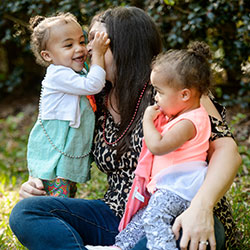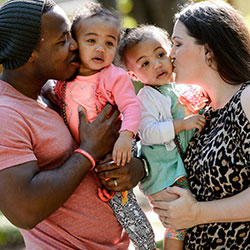Eva and Leah Joseph mirror each other in every way. These sisters dance together, laugh together, cry together - but now, at nearly two years old, they share a rare bond even for identical twins. They both have type 1 diabetes.
September 2, 2015 started a new chapter for Rebeka and Geordan Joseph. With the birth of their twins, their lives became full. “Eva came out first,” Rebeka remembered. “She was a whole minute before Leah.” With an instant family of four, the Josephs dove right into the merry-go-round of parenthood: diapers, bottles and naps.
In July of 2016, Rebeka noticed Leah acting a bit different. “Leah was always a happy baby. She was bubbly and always excited,” said Rebeka. But when she started to become easily agitated, thoroughly wetting her diapers and seemingly extra thirsty, Rebeka and Geordan grew worried. “We took Leah to Tallahassee Memorial’s Emergency Center - Northeast,” recalled Rebeka. It was there that Javier Escobar, MD, emergency medicine physician, took a closer look at all Leah’s symptoms. “Dr. Escobar examined every inch of Leah and tested her blood sugar,” Rebeka remembered. “He was quick and insightful. When he came back in the room, he shared that with a blood sugar as high as hers, it was very likely that Leah had diabetes.” At the time, Leah was experiencing diabetic ketoacidosis - her cells were so hungry due to the lack of insulin that they pulled energy from her fat. This process then began to produce a buildup of acids.
Leah was transferred and admitted to the Tallahassee Memorial Children’s Center, spending several days in both the Pediatric Intensive Care Unit and the main children’s floor. It was there that a team of doctors, nurses, dietitians and diabetes educators were assembled to support the Josephs as they prepared Leah to receive an insulin pump in the following weeks. “Leah was one of the youngest patients Tallahassee Memorial had seen with type 1 diabetes,” said Katherine Owen, RN, BSN, CDE, Diabetes Educator. “So it took collaboration between the Physician Partners — Metabolic Health Center, certified pediatric nurses, pediatricians and pediatric endocrinologist Dr. Larry Deeb to ensure Leah had proper, well-researched care.”
Beyond her care, the Josephs needed to feel confident to support their child outside of the hospital walls. Larry Deeb, MD, pediatric endocrinologist, said, “While diabetes within infants is unusual, we made a commitment that our community would provide the best diabetes care you can get.” Dr. Deeb and diabetes educators did just that.
Several weeks following their stay at the Children’s Center, Leah was brought back to meet with her original team of clinicians to receive an insulin pump. With the new device, diabetes educators taught Rebeka and Geordan how to administer the medication. “Dr. Deeb told me that I was not just a caregiver anymore. I was Leah’s doctor. Nobody knows her better than me. Her livelihood depended on me, so, with their support, I felt prepared to handle the complexity of the device,” said Rebeka.
 Through consistent visits with Physician Partners — Metabolic Health Center, the Josephs followed up with dietitians and diabetes educators to continue to learn how to adapt to their new lifestyle. Learning what foods to eat, how to manage the insulin pump, how Rebeka and Geordan would explain her condition to their toddler as she gets older, couples counseling — they are supported every step of the way. “We try to support families in every way we can. In the Joseph’s case, we know they want to turn this experience into advocacy, so we are trying to be able to send them to a conference for them to connect with other families and learn more,” said Katherine.
Through consistent visits with Physician Partners — Metabolic Health Center, the Josephs followed up with dietitians and diabetes educators to continue to learn how to adapt to their new lifestyle. Learning what foods to eat, how to manage the insulin pump, how Rebeka and Geordan would explain her condition to their toddler as she gets older, couples counseling — they are supported every step of the way. “We try to support families in every way we can. In the Joseph’s case, we know they want to turn this experience into advocacy, so we are trying to be able to send them to a conference for them to connect with other families and learn more,” said Katherine.
Just as habits were being formed and routines were set, the twins similarities only echoed further. In April of 2017, Eva also became diagnosed with type 1 diabetes. Now they care for two babies, and the process started all over again. “We knew Eva always had a 50% chance of having type 1 diabetes - we just didn’t think they would both have it under the age of two,” Rebeka remarked.
The Josephs are continuously learning how to care for their babies. As their little girls continue to grow, there will always be questions and constant adaptations due to their chronic condition. There will be hard times and times to cheer, but through it all they know they have a team ready to support them. “Our girls are our lives. The team at Tallahassee Memorial consistently treated them like their own,” said Rebeka. The odds that both twins would present with type 1 diabetes before the age of two may not have been likely, but the odds the Josephs will raise two incredible little girls is definitely in their favor.

